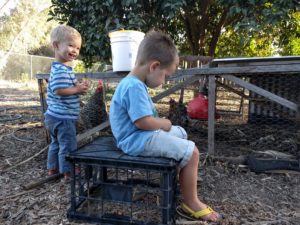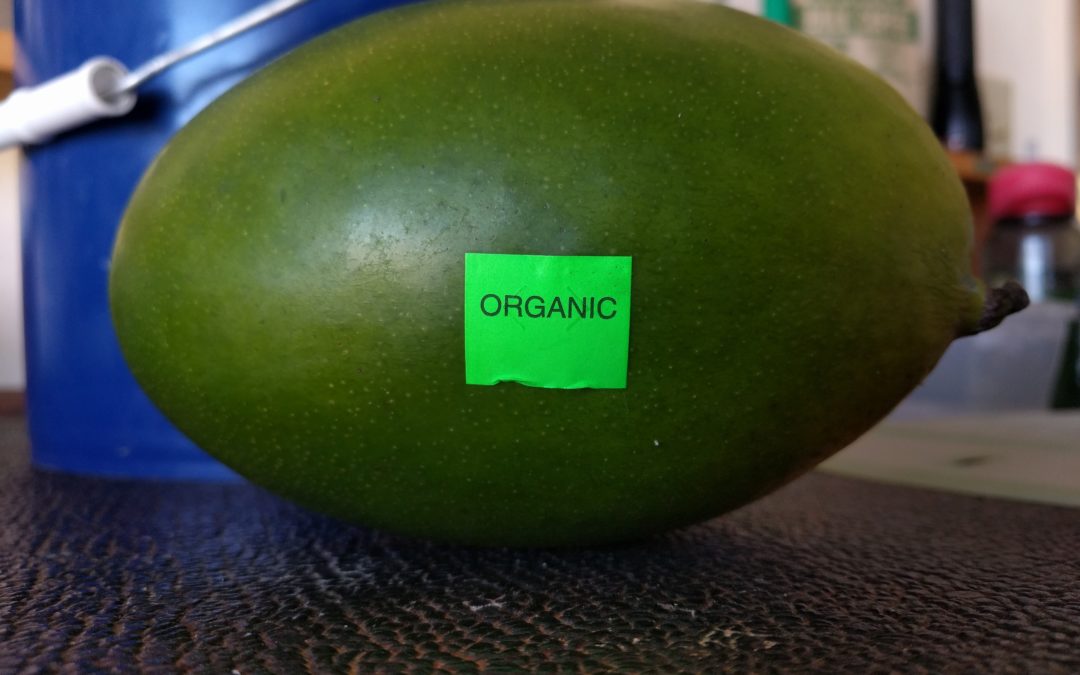When people learn that I grow a vegetable garden and have fruit trees they sometimes ask, “That’s great. Is it all organic too?”
Awkward silence.
I don’t know how to answer. I genuinely don’t know what people mean by “organic.” It’s not that I don’t know the word, of course. It’s that the word means different things to different people in different contexts.
But if I walk down the organic road with the person who asks me this question, then I usually come to understand that they mean by “organic” a general sense of healthy and natural. They don’t have a specific definition in mind — just a positive connotation that often, too, includes the idea of food grown without pesticides.
Two things always come to mind at this point. First, when we buy food at the grocery store or farmer’s market that is labelled organic, it means something very different than just generally healthy and natural. Organic is a guarded term that is owned by the federal government. There are reams of regulations that control which foods can be called organic, and farmers have to pay to be certified in order to label their products so. In this sense, the food I grow in my yard is not organic, and neither is yours.
Second, organic pesticides are a thing. By no means should we assume that organic fruits and vegetables in grocery stores haven’t been sprayed with substances designed to kill insects and other farming pests. The government maintains lists for concoctions they allow non-organic food to be sprayed with and concoctions they allow organic food to be sprayed with. And you know how people doing business are: If they’re allowed to do something, they often will. Organic farmers are no different. If they’re allowed to spray certain pesticides, they often will. They’re not bad people. They’re just people, trying to make a living, and following the rules.
You can listen to a few episodes of the Farmer to Farmer podcast and hear organic farmers talk about what they spray.
You can read “The National List of Allowed and Prohibited Substances” (not actual products, but ingredients that organic farmers are allowed to use).
And you can also read the “OMRI Products Lists,” which are the actual products that organic farmers are allowed to use.
Surprising “organic” practices allowed
I was surprised when I started learning about the use of the word organic by people on the production end of things: farmers, pest control advisors, nursery owners, weed scientists. I think my first surprise came when I was in a class about weed management, and someone asked the instructor about safe, organic options. The instructor, a University of California researcher, responded by first noting that organic does not mean safe or non-toxic. Don’t be mistaken, she said. Pyrethrin, for example — although derived from plants — can be more toxic than some synthetic insecticides.
The Xerces Society has a list of organic-approved pesticides that they say are highly toxic to bees. Pyrethrin is found on the list.
Discovering what is required for eggs to be labelled organic was another surprise. The hens that lay organic eggs aren’t necessarily wandering around pecking for earthworms. The hens aren’t even confined to a coop sometimes and out on a pasture at other times. They are allowed to live their entire lives in a stinky gigantic warehouse if the farmer wants to try to get away with that. Oh, but there’s a tiny enclosed porch attached to the warehouse where they have “outdoor access.”
(There is supposed to be a change in these requirements for organic eggs where hens might actually, necessarily get outdoors, but it’s not set to be fully implemented until 2022. The ruling can be read here, with some more details here.)
Read more than you ever wanted to know about organic egg production in the U.S. in this report from the Cornucopia Institute.
Milk that is labelled organic can also be produced under surprising circumstances. Organic milk cartons may show green pastures and rolling hills while the actual cows from which the milk comes stand in a lot that is covered with their own manure. This is not the norm, but as long as the cows appear to have access to pastures, they can apparently push through the organic certification bureaucracy.
(Read about examples of this at the Cornucopia Instiute and at the Washington Post. The actual federal regulations about organic livestock living conditions can be found here.)
There is a rift between how some organic farmers practice and the federal government’s rules about organics. One such general rule: “The producer of an organic livestock operation must establish and maintain year-round livestock living conditions which accommodate the health and natural behavior of animals.” I don’t know about your cows, but every cow I’ve met prefers to be always on the move and always ripping up fresh tufts of grass with its tongue. That appears to be its “natural behavior,” and it is a far cry from a feedlot. Back to the chickens: mine never choose to hang out in stinky buildings, never ever.

The greater rift, however, is between the organic farmers who get through the certification process without even truly following the rules versus the “real” organic farmers. There are a lot of organic farmers who run small businesses and genuinely care for their animals and go way beyond the bare requirements for government certification. Their chickens and cows actually do live like chickens and cows want to.
I live not far from one such small operation. Eben-Haezer lets a portion of their hens roam the land for all to see right there off Dye Road in Ramona. When we don’t get enough eggs from our own hens, we buy from those at Eben-Haezer.
One more surprising “organic” practice
There is, right this minute, November 3, 2017, an internecine battle coming to a head within the organic farming world. It looks like it might spell the end of the uncomfortable marriage between large certified-organic operations and smaller “real” organic farmers. Ultimately, it’s a battle about the definition of organic. Specifically, it’s about whether to stop allowing hydroponic vegetables to be certified and sold as organic. [See “Update” below.]
Read about the plea of the “real” organic farmers at the website Keep the Soil in Organic.
Wait, wait, wait, hydroponic vegetables? Haven’t seen any in my grocery store. That’s one of the complaints of these farmers: We consumers don’t even know that we’re buying hydroponic vegetables (and berries) because they are not labelled as such — they are only labelled “organic.”
But the real beef of these “real” organic farmers with the hydroponic growers is that they have no soil. Not soul, soil. They grow vegetables and berries by feeding the plant roots a chemical and water solution, the plant roots being contained in pots, never touching earth — and in the pots there is no dirt either. Why does this matter? The organic movement began many decades ago as a reaction against chemical fertilization of plants (which was encouraged by the USDA) and instead with a focus on taking care of the microbial life in the soil. “Feed the soil, not the plants,” was the mantra.
Even read the current USDA’s definition of organic farming: “Production practices . . . must maintain or improve the natural resources of the operation, including soil and water quality.”
Then how can there be “organic” food production without any soil at all?
What is organic?
I’ll end with this observation: Joel Salatin was right. Salatin is a farmer that has always worked in an organic spirit, if I can say that, but never thought it wise for the early organic farmers to have let the government take over their word and world. In his book The Sheer Ecstasty of Being a Lunatic Farmer he writes,
“That’s the problem with organic certification as a marketing tool. Now that the government owns the term and defines the protocol, the same kind of collusion toward shortcuts that defined corporate/government agendas now defines organics. For the life of me I can’t figure out why people who fought the USDA for decades because it pooh-poohed everything nature-respecting suddenly decided to turn over to the USDA the reins of organics. That’s called intellectual schizophrenia.”
So what is organic, actually? Organic is a lot of different things to different people in different contexts. Words can be shortcuts, encapsulating complex concepts in a small package, but this word “organic” is not one of them. Regular people, farmers, other farmers, businessmen, and bureaucrats all have different ideas in mind when they use the word or see that sticker on the mango.
And is my garden organic? I have no idea.
Update: The decision was made to continue allowing hydroponic operations to be certified organic by the USDA. Read about the decision here on Fresh Fruit Portal. Read about the perspective of those who wanted to keep the soil in organic here.
All of my Yard Posts are listed HERE




Best post yet. (except no pictures of children)
Ha ha! I love your posts!
Thank you very much, Sandy and Amanda. (Let me see what I can do about photos.)
Well that cleared up my questions. ..and my suspicions.
Hello Greg!
This is my second question/comment for you as I had another one about an avocado tree I ordered. Sorry to be bugging you so much! I just love your website!
My question is about vegetable gardening and weed control spray. After moving into a new house I found out that the previous owner sprayed a “broad leaf weed control spray” about 6 months ago. I have three small kids and would like to do some vegetable gardening but am concerned about any harmful chemicals getting into the vegetables we may consume. Is there a certain amount of time I should wait? It’s been over 6 months but I’m still a little worried. I read that you can plant sunflowers to help get some of the chemicals out. I was also thinking that a lot of the vegetables at the store are sprayed, even the “organic” ones as you mentioned in this post. So of course this is why I want to plant my own vegetable garden. But is a broadleaf weed killer worse than what is spayed on vegetables? Do I have any options? Thank you dearly, Danielle
Hi Danielle,
I heard Don’s great answer to your question on the Davis Garden Show. All I will add is that I empathize. When I moved in to my house, there were many containers of herbicides in the garage that had been used for years. It’s not a comforting situation in which to begin your food garden.
Thanks Greg! Thanks for recommending that show, I am very pleased and surprised that my question was answered. I really appreciate your time especially since I know you have three small kids! I have three kids under 6. So I want to say thanks for taking the time to help me so far with my gardening questions. Your website has been an amazing resource!
Also, I am just curious so if you don’t have the time to answer, it’s not absolutely nevcesary. Did you do anything to combat the chemicals that were used at your place? Thanks a million, Danielle
No, I didn’t do anything about it. I didn’t even know for sure where they’d been used and how long ago.
Consumers are both frightened about their food but also ignorant and just a little lazy. They get suckered in by gimmicks and nice-sounding buzzwords. There’s a restaurant that advertises it serves “clean” food. What does that mean? They don’t elaborate. If a farmer puts urea from urine on a crop, it’s “organic.” But urea from a bag is forbidden. Barley can be labeled “no GMOs” but it’s genes were modified thousands of years ago in Mesopotamia. Some activists wanted food sterilized with radiation, perfectly safe, revealed on labels but cooler heads prevailed. And there’s no label that says “humane” or “non-polluting” or “soil building” or “not exploitative of human labor.”
Putting the government in charge of the vocabulary creates two problems 1) the usual incompetence and 2) influence peddling to companies willing to pony up campaign donations. Of course moms don’t want to feed their families “dirty” food but the “organic” label doesn’t rule out infection with E. coli. In chemistry, “organic” means “contains carbon” but in the food marketplace it might as well say “meaningless marketing scam.”